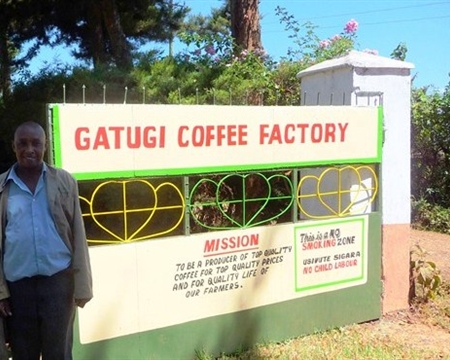Kenya Nyeri Othaya Gatugi AB – 21TY0006 – 29344-1 – GrainPro Bags – SPOT COSEATAC
Position Spot
Bags 0
Warehouses Seattle
Flavor Profile Orange, lemon, floral, effervescent, sweet
Please Note This coffee landed more than 8 months ago.
Out of stock
About this coffee
Grower
500 producers organized around Gatugi Factory
Altitude
1700-1890 masl
Variety
SL28, SL34, Ruiru 11, and Batian
Soil
Volcanic loam
Region
Othaya, Nyeri County, Kenya
Process
Fully washed and dried on raised beds
Harvest
October- January
Certification
Conventional
Coffee Background
Mt. Kenya, at the helm of Kenya’s Central Province, is the second tallest peak on the continent of Africa and a commanding natural presence. The mountain itself is a single point inside a vast and surreal thicket of ascending national forest and active game protection communities. The central counties of Kenya extend from the center of the national park, like six irregular pie slices, with their points meeting at the peak of the mountain. It is along the lower edge of these forests where, in wet, high elevation communities with mineral-rich soil (Mt. Kenya is a stratovolcano) many believe the best coffees in Kenya, of-ten the world, are crafted.
Nyeri is perhaps the most well-known of these central counties. Kenya’s coffee is dominated by a cooperative system of production, whose members vote on representation, marketing and milling contracts for their coffee, as well as profit allocation. Othaya Farmers Cooperative Society, the umbrella organization that includes Gatugi Factory, is one of Kenya’s larger societies, with 19 different factories and more than 14,000 farmer members across the southern Nyeri region. The Gatugi Factory has 500 members actively harvesting and delivering to the processing center. The factory’s total cherry in-take tends to
Othaya Farmer Cooperative Society is one of key member societies of the Kenya Cooperative Coffee Exporters (KCCE) organization. KCCE is an historic organization of almost 4,000 individual cooperatives. The group was formed in 2009, with the express goal of managing marketing and exporting operations cooperatively, as opposed to contractually with third parties. The economics of smallholder systems are consistently difficult everywhere in the world, and in Kenya in particular the number of individual margins sliced off an export price before payment reaches the actual farms is many, leaving only a small percentage to support coffee growth it-self. And most often this arrives many months after harvest. KCCE, by managing more of the value chain itself, can capture a greater margin on behalf of the farms. The chairman of Mahiga Factory, anotherer Othaya FCS member, happens to also be one of the founding directors of KCCE—so, the participation of Othaya FCS in farmer-forward infrastructure in Kenya is strong.
Kenya is of course known for some of the most meticulous at-scale processing that can be found anywhere in the world. Bright white parchment nearly perfectly sorted by density and bulk conditioned at high elevations is the norm, and a matter of pride, even for generations of Kenyan processing managers who prefer drinking Kenya’s tea (abundantly farmed in nearby Muranga county) to its coffee. Ample water supply in the central growing regions has historically allowed factories to wash, and wash, and soak, and wash their coffees again entirely with fresh, cold river water.
Gatugi typically ferments for 27-35 hours depending on ambient conditions (the changing mountain climate, as for many processors, tends to dictate fer-mentation temperatures, and Gatugi staff are required to check fermentation progress every three hours). After fermentation, the parchment is rinsed and the water replenished, and the clean parchment soaks for an additional 12 hours, after which it is sorted by density and brought to the tables to dry, typically for two weeks. After drying is complete the coffee is stored on site and eventually delivered to the Othaya dry mill for grading and a final density sort. The established milling and sorting by grade, or bean size, is a longstanding tradition and positions Kenya coffees well for roasters, by tightly controlling the physical preparation and creating a diversity of profiles from a single processing batch. hover around 323,000 kgs, meaning the average member of Gatugi is farming enough coffee fruit for roughly two 60kg bags of export-able green.







